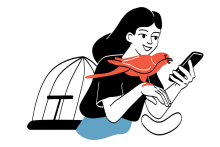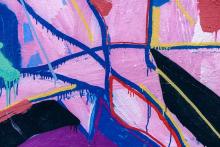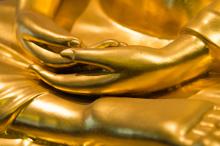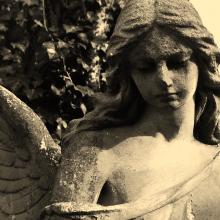care

WHEN I STEPPED off our back porch that June morning, some kerfuffle of squawks, feathers, and paws stopped me. There was Tom, our all-gray feral cat, slinking about. Then I made out some red streaks above — cardinals. I noticed Tom had something in his mouth. I cringed. Legs? Wings? Tail? Head? It was a baby bird. Its parents were hot on Tom’s trail.
Some sense of moral — my husband would say unnecessary — responsibility got hold of me. In that moment, I decided I was not going to let the cat I had brought into this backyard eat that bird, no matter how many birds he’d already nabbed. I yelled and chased Tom. And after I shamed the cat into dropping his prey under the trampoline, my 8-year-old son, Oliver, rescued the fledgling.

As Baptist minister and CEO of the Religious Coalition for Reproductive Choice, Zeh has participated in plenty of “circular conversations regarding the moral absolutes of abortion.” But as she writes in her new book, A Complicated Choice: Making Space for Grief and Healing in the Pro-Choice Movement, these debates often overlook how abortion always “happens within a person’s real, full, and complex life.”

I’m always very curious about what belonging truly means to a community, and how it is demonstrated. I always wondered, who makes the rules of belonging? Who decides what is and isn’t allowable? Can it go so far as to diminish our humanity or cause us to diminish someone else’s? Many of my early talks with God included questions like these. I still don’t have the answers to all of them, but I’ve spent the past several years trying to find a home inside of the tension between our revolutionary capacity for love as human beings, and our frequent tendencies toward exclusion, destruction and harm.

Could Christianity's future lie in Buddhism's past? This is a possibility that's been haunting me lately, but in a good way, I think.
One big critique, understandably, of postmodern views on Christian spirituality is that there's too much time and energy spent deconstructing old systems and ways of thinking that need to be torn down or reimagined, while lacking the same effort to build up something more helpful — more Christ-like — in its place.
This is true, and I'm as guilty of it as anyone. In my current spiritual practices as part of the current year I'm calling “My Jesus Project,” I'm trying to more fully understand what we mean when we talk about following Jesus. So it might seems strange to some that I would look to Buddhism for help in rebuilding my daily walk along the path of Christ.
Author and monastic Thich Nhat Hanh wrote a book years ago called Living Buddha, Living Christ, that had a profound impact on me. At the time, I was “A-B-C,” or “anything but Christian.” I had been thrown out of my church of origin for asking too many questions, and up to that point, I assumed there was no way I could ever associate myself with Jesus or the Gospel again. Thankfully — if surprisingly — it was a Buddhist monk who reintroduced me to Jesus.
In his book, he draws many parallels between the life, teaching, and practices of Jesus and those of Siddhartha Gautama, later known as The Buddha after achieving enlightenment. For Jesus, I imagine a similar experience of enlightenment coming to him during his monastic retreat into the desert. And as I seek my own moments of illumination during My Jesus Project, it occurs to me that Buddhism has much to teach us about where we might take Christianity in the 21st century.
No Ego
One of the greatest weaknesses of modern Christianity has been the focus on the individual. This comes more from our individualistic culture than from Christianity itself. Though we focus on personal (often translated as sexual) sin, the idea of sin within the Hebrew Bible was more corporate. There was more of an interdependent, tribal culture, and as such, so were the shortcomings. We've also focused too much on personal salvation or a “personal relationship with Jesus Christ,” which has also led to such bastardized interpretations as the false gospel of personal prosperity.
In Buddhist practices, one must learn to let the self die, in a manner of speaking, in order to create a deeper, more meaningful relationship and interdependence with others and the rest of creation. This is actually more consistent with ancient Jewish and Christian thought than our modern, egocentric version of Christianity.

JULIE OWENS had no way of knowing that, within days of saying her marriage vows, she would become a victim of domestic violence. She grew up in a Christian home. Her father was a pastor. Her brother was a pastor. Her uncles were pastors. Her parents had a beautiful and enduring marriage. She was well educated. She was well traveled. And she was deeply in love.
During her honeymoon, Julie quickly realized that her husband now believed he owned her, a belief that would soon be followed by verbal abuse and, toward the end of their marriage, physical abuse.
The abuse began with an irrational jealousy. Then the name-calling began, along with accusations of infidelity. He isolated her from her friends and family. He showed up at the school where she worked as a special education teacher to “check on her.” Later, he started taking the car keys away from her. He even cut the spark-plug wires in their car so that he would always know her whereabouts. He threw dishes at her, disconnected the phone in their rural home, and threatened to harm her, their pets, friends, and even their unborn baby.
Three months into the marriage, Julie knew that his behavior was not normal and the couple separated.
Over the course of the next three months, she went to marriage counseling while her husband went to substance-abuse counseling. In search of help, she spoke with counselors, pastors, and others—yet not one of them ever uttered the words “domestic violence.” Instead, she was told that her husband was dealing negatively with “stress” and that he was “acting out” because he was raised in an abusive family.

I had a series a while back about the Christian Cliches that we should drop from our lexicon, and since then I’ve had people ask what they should be saying instead. So here’s a list of handy phrases to help bring followers of Jesus into a post-Christendom, 21st-century world.

Recently I’ve been re-reading Susan Cain’s excellent book, Quiet: the Power of Introverts in a World that Can’t Stop Talking. Extroverts will want to take it with a grain of salt (although some of the book’s speculations suggest that extroverts are fairly thick-skinned about being taken down off their pedestals), but the book is a fascinating exploration of what it’s like to be an introvert in the world, including some analysis about how one gets to be an introvert, anyway, including how much is genetic, and how much comes from early environment.
It was in reading one of these “nature or nurture?” passages that I first encountered the “orchid hypothesis.” Taking its name from David Dobbs’ 2009 article, “The Science of Success,” published in The Atlantic, the orchid hypothesis essentially argues, as Cain puts it, that:
“… many children are like dandelions, able to thrive in just about any environment. But others, including the high-reactive types that [developmental psychologist Jerome Kagan] studied, are more like orchids: they wilt easily, but under the right conditions can grow strong and magnificent.” (Quiet, 111)
This jumped off the page at me.